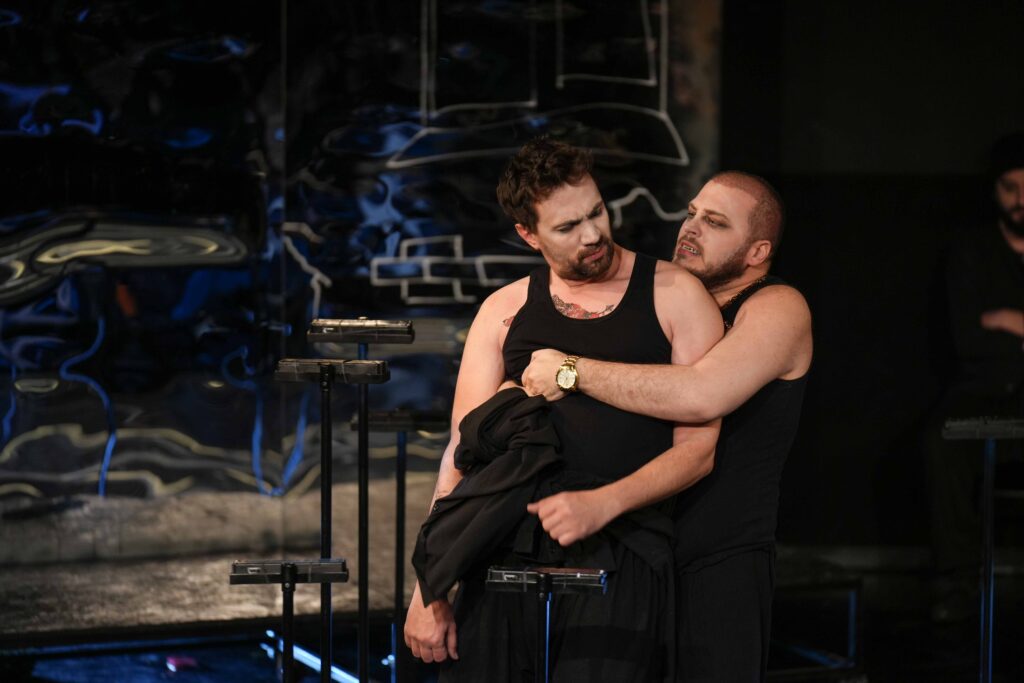Belgrade Drama Theatre, premiere 10th February 2024
People Without Graves is an unarguably ambitious theatre project. It lasts almost three hours and features a cast of 10 actors from the joint ensembles of co-producers BDP and Regional Theater Novi Pazar. It is based on the no less ambitious novel, based on Enes Halilović’s 26 years of research on urban local legends in Novi Pazar. Stevan Bodroža’s production presents us with a refreshing view into Novi Pazar’s culture, lore, social life, and language. However, it is extremely violent and contains elements that some might find triggering and irresponsible.
Halilović’s novel is a modern Oedipus Rex story about a writer’s discovery of the past crimes of his parents. He has a big tragic story to tell. But the way the text romanticizes violence in relation to this tragic story is problematic. It feels like he is using violence to make the story interesting and intense.
People Without Graves concerns itself with life a writer who grew up in Novi Pazar and the various tragic events that shaped his life and that of his family. This is related via retrospective narration and a lot of switches between storylines taking place in the present and past (indicated by neon letters that say ‘Present’ and ‘Past’ (scenography: Zorana Petrov).This mode of narration gives this family tragedy a feeling of a crime story, with the past unraveing and explaining the future. The sins of ancestors are passed on to the next generation.
In one storyline, a man called Numan (Rifat Rifatović) ends up in prison after fighting with a local mafia boss (Aleksandar Jovanović), because he was protecting his sister (Lemana Bećirović) from his attempt to seduce her. While he was in prison, the woman he was in love with (Ema Muratović) was forced to marry the other man, against her will. Later, he will murder her and go on to kill other people, while police search for him, and eventually kill him.
The other storyline is about his son, Semir (Amar Ćorović), the writer, who will go on to document his own childhood in Novi Pazar, growing up without a father. His first love is played by the same actress, Ema Muratović, as his father’s first love; Semir then cheats on her with another girl (Kristina Jevtović, the same actress that plays his mother) when he moves to Despotovac with his temporary foster family. In the end, he discovers that his true father was his boxing coach (Haris Šećerović) and that his mother, Numan’s wife at the time, was impregnated in either an orgy or a gang rape – it is not clear.
We also learn about the fate of his aunt, Badema (Milena Pavlović), who was a victim of domestic violence by her late gambling addict husband, who even sold her to a police officer in an act of sex trafficking. She killed the police officer and went to prison for 10 years. Pavlović stands out in the role of woman with PTSD, a defender of her family, and a victim of circumstances with a strong enough will to live through it all, with a sense of humour and a survival instinct.
The world of these stories is not merciful to anyone, especially not to women. It is the cruel, rural, and poor environment of Novi Pazar, some 20-40 years in the past. The main reason for all of this tragedy is – at first glance – poverty and the class conflict between the poor family of the protagonist and the mafia boss Farkaš, but at the core, the true reason for the endless circle of violence, is that no one is able to break the chain.

People Without Graves. Photo: Dragana Udovicic
The primary antagonist is Farkaš, who started the initial conflict with Numan that put him in prison. He always provokes the other characters, especially Semir and Numan, most rudely. Aleksandar Jovanović does a great job of portraying him as a villain, an embodiment of the capitalist patriarchy, a local tough guy, with a gold chain around his neck, swaggering and aggressively masculine, seducing women, mostly with his money and disrespectful attitude.
On the other hand, we Jovanović in a completely different role, playing the cuckolded husband who with his wife decides to (temporarily) adopt Semir. The funniest scene is the one where they show Semir the town where they live, though this scene ends with the husband enjoying watching his wife having sex with another man. The character is performed markedly differently from Farkaš, the pitch of Jovanović’s voice is much higher; he talks a lot and very fast, and asks a lot of questions, just like a child. The humour in this show is always combined with elements of the grotesque. because the world of the story is very dark.
The darkness of the play is visually accented by the absence of light in the room and the complete domination of black in the costumes and scenography. At some point, the actors wear white makeup on their faces, but the reason for this is not very clear.
The biggest source of darkness is the naturalistic acting approach deployed by the cast in these traumatic stories. The whole cast does a great job of representing the trauma and violence. Amar Ćorović was very convincing as the narrator, the young man dealing with the difficulties of being an orphan and living in poverty, fighting for justice, until, at some point, without much drama, he decides to explore his immoral side and cheat on his girlfriend, before writing the apology of his father’s violence that is this novel .
Despite the power of the actors’ naturalism, one has to question whether this was the best directorial approach to staging a story about violence. The violence on stage is represented realistically, with physical fights between the actors and the firing of prop guns into the audience, something which could have been very triggering for the local audience considering recent events in Serbia – the mass shootings in May last year at the Primary School Ribnikar and the other in Dubona and Malo Orašje, where a young man killed 9 and wounded 12 people – as well as on people traumatized by the war in the 90s.
The fact is, this is a play where one of the main storylines is about the romanticization of femicide as a crime of passion, framing it as the scream of a wounded man with a broken heart. This doesn’t sit well with the fact that in 2023 there were 28 women killed in femicide by men close to them in Serbia. And let’s not even start with the misogyny displayed in this play – with women being portrayed as either madonnas or whores. (Ema Muratović always plays the madonnas; Kristina Jevtović plays all the whores).
We live in a violent, patriarchal society that romanticizes and mystifies the murder of women. But is the best way to confront this by watching plays about a murderer who is portrayed as a victim of circumstance and becomes a local legend?
This show is not without its qualities. It is a well-acted and dynamic production. It is visually and musically elegant. However, it’s capacity to retraumatize people cannot be overlooked. It feels like any chance of healing the collective trauma in this show is replaced with bragging, bigging up your tough backstory and staying in victim mode. It’s disempowering and irresponsible, and, speaking in the language of Greek tragedies, true hubris.
Credits
Director Stevan Bodroža//Based on the novel People without Graves (Ljudi bez grobova) by Enes Halilović// Dramatugy: Aleksandra Jovanović, Nina Plavanjac//Scenography: Zorana Petrov//Costumes: Tatjana Radišić//Composer: Haris Šećerović//Stage movement: Aleksandra Arizanović
For further information, visit: BDP.rs
Mina Milošević is a playwright, dramaturg, screenwriter, and theoretician based in Belgrade. She holds a BA in Dramaturgy and an MA in Theory of Drama Arts at the Faculty of Dramatic Arts in Belgrade. She worked as a dramaturg on plays in Atelje 212, Belgrade Drama Theatre, Yugoslav Drama Theatre, National Theatre in Belgrade, and Oda Theatre in Prishtina. Her play "Dr Ausländer (Made for Germany)" was presented at BITEF festival 2022. Her master's thesis on female friendship in Serbian contemporary theatre won the "Professor Boško Milin" Award.








